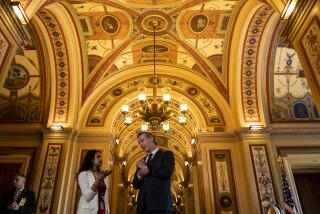Brown argues for his budget plan in State of the State address
- Share via
Reporting from Sacramento — Gov. Jerry Brown told lawmakers Monday that “it would be unconscionable” not to let voters decide whether to pay more taxes to help balance the budget, using his first State of the State address as California’s 39th governor to press Republicans to agree to a special election.
Invoking the democracy movements in North Africa to bolster his bid that the people be heard, Brown warned GOP lawmakers against impeding a referendum that would allow voters to sanction — or refuse — extended income, sales and car levies to help close a $25-billion budget shortfall.
“When democratic ideals and calls for the right to vote are stirring the imagination of young people in Egypt and Tunisia and other parts of the world, we in California can’t say now is the time to block a vote of the people,” Brown said. “…The state belongs to all of us, not just the people in this chamber.”
The governor, who unveiled no new policy proposals in his 14-minute address to a joint session of the Legislature, stayed focused on his wish to take the tax question to voters in the summer, which would require lawmakers to act by late March. But there has been little movement in the Legislature since Brown announced his idea several weeks ago.
Some Republican votes would be needed to put a tax measure on the ballot, but many GOP lawmakers have said they would not agree. Brown departed from his script more than once Monday evening to challenge them to produce an alternative budget plan and chide them for what he suggested was intransigence.
After declaring that “it is time for legislative check-in” with the people, Brown dryly took note of the lack of applause from Republicans in the audience.
“I want to see a few Republicans clapping on that,” he said. “Or, if you want to block the people’s right to vote, stand up and say, ‘Block that punt!’ ”
State of the State speeches typically afford governors an opportunity to lay out an ambitious governing agenda and wish lists for the year ahead. Brown used his first State of the State address 35 years ago to suggest eliminating income taxes for the poor and call for the creation of the California Conservation Corps.
His pitch was a reminder of how California’s financial problems now overshadow everything the government does. The idealism of the past was replaced with a pragmatic push for a handful of votes.
Republican leaders were dismissive, however. They noted that an extension of the same temporary tax increases Brown wants to renew appeared on the ballot in May 2009 and was resoundingly rejected.
“Higher taxes didn’t solve the problem two years ago, [and] it won’t solve it now,” said Senate Republican leader Bob Dutton of Rancho Cucamonga. “Taxpayers already said no.”
Dutton called on the governor to cut spending more deeply and to do away with what Republicans consider burdensome regulations on business.
In his speech, Brown suggested he would work with Republicans on their demands to reevaluate the state’s regulatory environment, rein in the cost of public employee pensions and reform the criminal justice system. But he nodded to the issues almost in passing, offering no concrete plans or further details.
Nevertheless, some found the overtures encouraging.
Assemblyman Bill Berryhill (R-Ceres) said if the governor were to meet GOP demands for making California’s regulatory and tax environment more hospitable to business, he might consider supporting a ballot measure.
“To close off anything at this juncture would be irresponsible,” he said. “I think there’s some give and take that can happen here. Absolutely.”
Berryhill is one of the few GOP lawmakers who have not signed a pledge to resist all new state taxes. Party activists say voting to put the Brown plan on the ballot would violate that pledge.
But the California Chamber of Commerce, an ally of Republican legislators, also left a door open.
“We share the governor’s priorities of solving the state’s budget crisis and improving our economy,” said a statement from Allan Zaremberg, the group’s president and chief executive. “We look forward to working with Gov. Brown and the Legislature to achieve these important goals for our state.”
In his speech, Brown reprised the call for shared sacrifice and a scaling back of state government that he made in his inaugural address last month. And his invitation to GOP lawmakers to join his effort gave way to pointed jabs.
“Under our form of government, it would be unconscionable to tell the electors of this state that they have no right to decide whether it is better to extend current tax statutes another five years or chop another $12 billion out of schools, public safety, our universities and our system of caring for the most vulnerable,” he said.
At an impromptu news conference on the Assembly floor after the speech, he expressed irritation that GOP lawmakers have yet to show how exactly they would balance the budget. Brown’s plan includes deep reductions in virtually every sector of government except public schools; state universities, parks, community colleges, healthcare programs and welfare services would all be hit hard.
The governor said he has had several private meetings with legislators who called for the budget to be balanced with reductions alone but has yet to see any of them “lay out $25 billion in cuts … so I don’t think they mean that.”
Brown said that if Republicans are sincere about “something that devastating,” they should check with voters, who “might want to offer an opinion.”
Times staff writers Patrick McGreevy and Michael J. Mishak contributed to this report.
More to Read
Get the L.A. Times Politics newsletter
Deeply reported insights into legislation, politics and policy from Sacramento, Washington and beyond. In your inbox twice per week.
You may occasionally receive promotional content from the Los Angeles Times.











